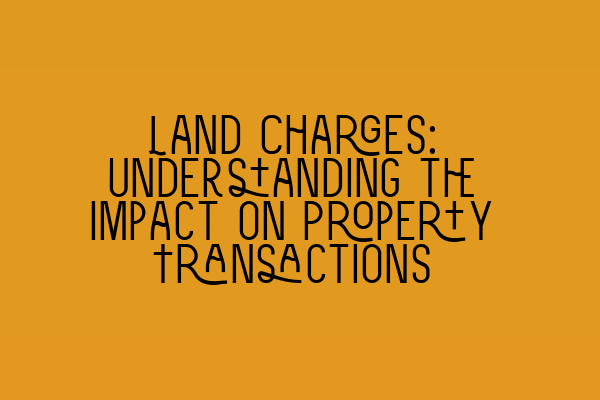Land Charges: Understanding the Impact on Property Transactions
When it comes to property transactions, there are a multitude of factors and considerations that need to be taken into account. One such factor that often plays a crucial role in the process, but is not always properly understood, is land charges. In this blog post, we will delve into the concept of land charges, its impact on property transactions, and why it is of utmost importance to comprehend its implications.
What are Land Charges?
In essence, land charges refer to certain interests in land that are registered and protected by law. These interests can affect the ownership or rights over a property and can have significant implications on property transactions. Land charges are typically registered at the Land Charges Registry, which is maintained by the Land Registry in England and Wales.
Types of Land Charges
There are several types of land charges that can impact property transactions. Some of the most common ones include:
1. Class D Land Charges: These are charges that arise from judgments or orders of the courts, such as charging orders, stop orders, or maintenance orders.
2. Class F Land Charges: These include various local land charges, such as drainage charges, improvement grants, or tree preservation orders.
3. Class H Land Charges: These are historical charges that have been maintained on the Land Charges Register since its creation in 1975. They include matters such as restrictive covenants, equitable charges, or easements.
4. Class K Land Charges: These include bankruptcies and insolvencies, such as bankruptcy restrictions, annulments, or interim orders.
Importance in Property Transactions
Understanding land charges is crucial in property transactions as they can affect the ownership and rights of a property. For example, a land charge in the form of a restrictive covenant may limit the use or development of a property. This information is vital for both the buyer and the seller to make informed decisions and negotiate the terms of the transaction.
Moreover, obtaining clear and accurate information about land charges is essential during the due diligence process. It ensures that all relevant charges are identified and taken into consideration before proceeding with the transaction. Failure to identify and address land charges can potentially lead to legal disputes or financial liabilities in the future.
Impact on Financing
Land charges can also have a significant impact on property financing. Lenders often require a comprehensive search of land charges before approving a mortgage or loan application. This helps them assess the risks associated with the property and make informed decisions about lending. If significant land charges are discovered, it may affect the lender’s willingness to provide financing or result in additional conditions being imposed.
Conclusion
In conclusion, understanding land charges is crucial for any property transaction. It helps buyers and sellers identify potential issues and negotiate terms effectively. Conducting thorough searches of land charges is essential to ensure that all relevant interests are taken into account during the due diligence process. Finally, lenders rely on land charge information to make informed decisions about property financing. By understanding and addressing land charges, both buyers and sellers can proceed with property transactions confidently.
If you found this article useful, you may also find these related articles helpful:
– Interactive SQE Mock Tests for Contract Law: Test Your Knowledge
– Contract Law Reforms: An Analysis of Recent Changes
– Parties in a Contract: Rights and Responsibilities
– The Importance of Ethics in Contract Law: A Comprehensive Guide
– Unveiling Duress and Undue Influence in Contracts
Remember, when it comes to property transactions, knowledge is power, and understanding land charges is an essential part of making informed decisions and ensuring legal compliance.
